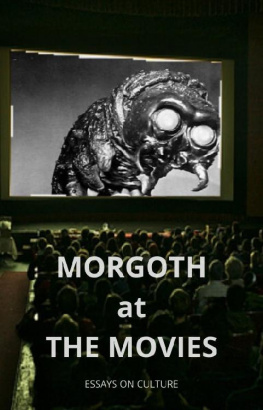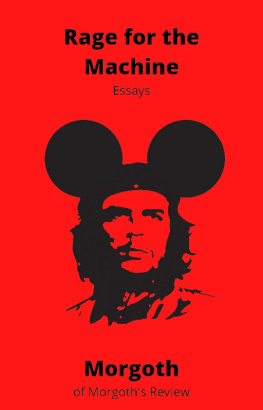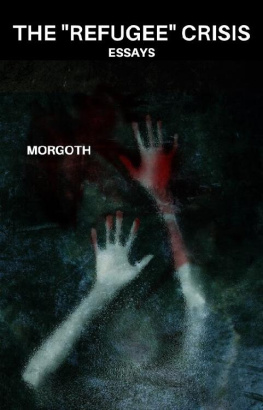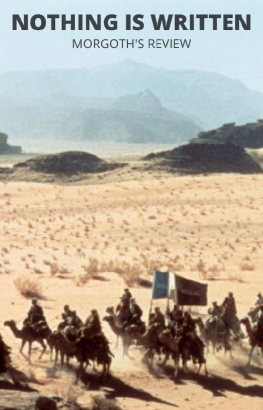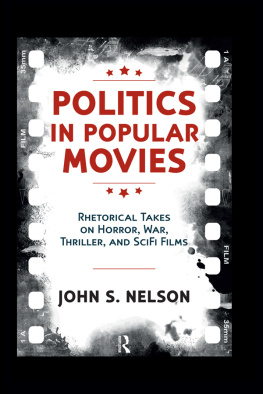Morgoth - Morgoth at the Movies
Here you can read online Morgoth - Morgoth at the Movies full text of the book (entire story) in english for free. Download pdf and epub, get meaning, cover and reviews about this ebook. genre: Art. Description of the work, (preface) as well as reviews are available. Best literature library LitArk.com created for fans of good reading and offers a wide selection of genres:
Romance novel
Science fiction
Adventure
Detective
Science
History
Home and family
Prose
Art
Politics
Computer
Non-fiction
Religion
Business
Children
Humor
Choose a favorite category and find really read worthwhile books. Enjoy immersion in the world of imagination, feel the emotions of the characters or learn something new for yourself, make an fascinating discovery.
Morgoth at the Movies: summary, description and annotation
We offer to read an annotation, description, summary or preface (depends on what the author of the book "Morgoth at the Movies" wrote himself). If you haven't found the necessary information about the book — write in the comments, we will try to find it.
Morgoth at the Movies — read online for free the complete book (whole text) full work
Below is the text of the book, divided by pages. System saving the place of the last page read, allows you to conveniently read the book "Morgoth at the Movies" online for free, without having to search again every time where you left off. Put a bookmark, and you can go to the page where you finished reading at any time.
Font size:
Interval:
Bookmark:
Morgoth at the Movies
Essays on Culture
by
Morgoth
of
Morgoths Review
Table of Contents
MOVIES
MUSIC
TELEVISION
INTERNET DOCUMENTARIES
ADVERTISEMENTS
RADIO
BOOKS
PUBLIC MONUMENTS
SPORT
VIDEO GAMES
Welcome to Morgoth at the Movies. This e-book collects Morgoths writings on popular culture.
Although we chose the title because movie analyses predominate (and because we couldnt resist the alliteration), in fact this volume has all of Morgoths writings on all cultural genres: not just movies, but also music, television, video games, advertisements, literature, and sport.
Dont forget to support the cause. You can support Morgoth at the following sites:
https://www.subscribestar.com/morgoth-s-review
https://www.patreon.com/Morgoth
https://ko-fi.com/morgoth1
Enjoy the book.
George Elwit
georgeelwit@gmail.com
Spring 2020
Movies
Spartacus: Marxism and Rome
May 2015

During a recent holiday weekend I finally had the chance to revisit a classic swords-and-sandals epic. I knew Spartacus (1960) was a bit left wing, and I was also aware that Spartacus as a historical figure was an icon of Marxist revolutionaries the world over. However, on further investigation, I became fascinated by the movie, both its background and what was happening on screen.
To be brief, during the 1950s conservative white Americans began a belated, and ultimately doomed attempt to regain control of the movie industry which they now recognized as being in the hands of Marxists, the vast majority of whom were Jewish. Spartacus was a reaction from those subversive elements, while at the same time containing more of the Marxist themes and subversive ideas which had angered white conservatives to begin with. Jewish actor Kirk Douglas was the driving force behind Spartacus, eventually settling on Jewish director Stanley Kubrick to direct, David Lean having turned it down, and Jewish director Anthony Mann not being able to handle the vast scale of the film.

The plot of Spartacus is well known. Set in the Roman Empire, Spartacus tells the story of slaves and gladiators rebelling against the Roman tyranny and seeking either to escape Italy completely or destroy Rome itself.
Within Rome we discover tensions are at an all-time high, with the patrician class and plebeians vying for power. One side is represented by a brilliant Olivier playing Crassus, who is what we would think of as a radical traditionalist, and Gracchus, equally well-played by Charles Laughton, who represents the liberalistic plebeians, or the mob.
The film opens with a monologue which concludes: There under whip and chain and sun he [Spartacus] lived out his youth and his young manhood, dreaming the death of slavery 2,000 years before it finally would die.
In actual fact just several decades before Spartacus was made, Judeo-Marxists had created and were operating the largest system of human bondage and slavery ever seen by mankind, the gulag in the USSR. But the critique only ever emanates from one direction and has only one target: Western Civilization and the people who built it. In this case it is Rome, but it could just as easily have been the Russian Empire, Germany, Europe in general, or modern day America. The method is also consistent: the marginalized and the oppressed being led by Jewish people into rebellion and war against the European.
In Spartacus, the rebellion begins when Crassus demands the Gladiator school force two men into a death match. Spartacus and a negro are chosen.

The Negro defeats Spartacus but rather than kill him decides to sacrifice himself for the brotherhood of man and directs his trident toward Crassus. Crassus stays put and swiftly dispatches the negro with his knife. Crassus is no coward, no pampered aristocrat.
The negro represents the plight of blacks in America at the dawn of the civil rights movement, which was, of course, Jewish-led. Spartacus slave army is multi-ethnic in make-up. And so we begin to see where and what the message is: Kirk Douglas and Tony Curtis, both Jews, heading the oppressed masses into violence against the European system. Crassus is the conservative, the patriarch, the fascist; he revers Rome precisely because of its power and glory and despises the mob of Gracchus as weak and corrupt.
Its interesting to note that Gracchus, like present day Liberals, views the potential of a tyranny under Crassus as worse than the destruction of Rome at the hands of the slave army. Ill take a little corruption over the tyranny of Crassus any day of the week, he says. Gracchus also mocks Crassuss love of Rome: Most of us see Rome as a kindly old mother, Crassus is intent on marrying the old girl, to put it politely. But what Gracchus does not recognize but Crassus does, is that the brotherhood of man ideal poses an existential threat to everything Rome stands for. What we are witnessing is a clash of what Nietzsche called master-slave morality:
...the Jews achieved that miracle of inversion of values thanks to which life on earth has for a couple millennia acquired a new and dangerous fascination--their prophets fused rich, godless, evil, violent, sensual into one and were the first to coin the word world as a term of infamy. It is this inversion of values (with which is involved the employment of the word for poor as a synonym for holy and friend) that the significance of the Jewish people resides: with them there begins the slave revolt in morals.

The end result of the slave morality is only more slaves struggling under a Jewish yoke, the Jew having replaced the European master. The master morality allows an upward mobility if the individual is up to the task. Thus, an inegalitarian morality will, over time, drag the whole civilization ever upwards, while the slave morality will drive the civilization downwards, under Jewish domination. Rome was built by masters.

Crassus - not an SJW!
The people who created Spartacus seem to have understood this to a degree, which is why Crassus stands in for any other gentile, with scant regard for a moral code which turns his people and society into a mass of debased slaves. The Hollywood mind-benders take these things very seriously, while the muddled liberals are correctly seen as dead wood waiting to be cleared away, by both sides.
As Spartacus and his increasingly large and imposing army rampage their way across the very heart of the Roman Empire, Gracchus and the mob in the Senate send in regional garrisons and regiments of Roman soldiers; they are easily defeated. The camera hangs lovingly on the tattered masses of the downtrodden and poor as they march onward. Their goal is to pay pirates who are also hostile to Rome to take them all across the sea and away from Rome. Gracchus, meanwhile, has actively assisted Spartacus, knowing that the longer the slave army remain in Italy the more likely a Crassus takeover will be.
Next pageFont size:
Interval:
Bookmark:
Similar books «Morgoth at the Movies»
Look at similar books to Morgoth at the Movies. We have selected literature similar in name and meaning in the hope of providing readers with more options to find new, interesting, not yet read works.
Discussion, reviews of the book Morgoth at the Movies and just readers' own opinions. Leave your comments, write what you think about the work, its meaning or the main characters. Specify what exactly you liked and what you didn't like, and why you think so.

